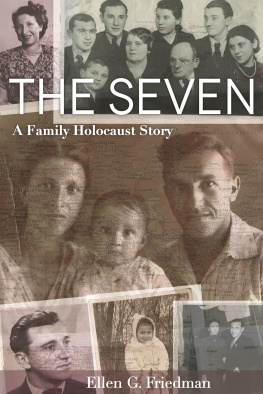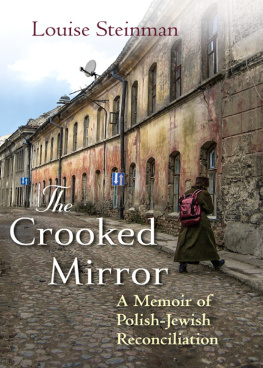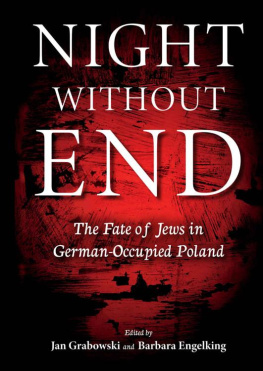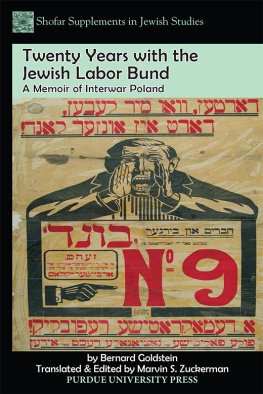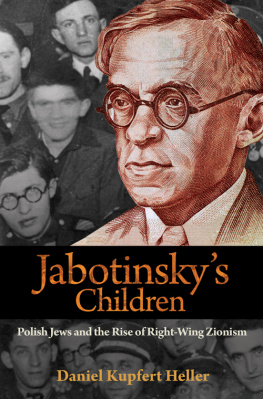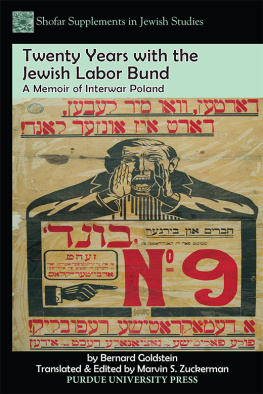Jeffrey Koerber is assistant professor of history at Chapman University. He holds a PhD in Holocaust history from Clark University as well as bachelors and masters degrees in architecture from the University of Illinois at Urbana-Champaign. His research examines the relationships between place, historical actors, and events. He has received fellowships from Claims Conference, the University of Southern California Shoah Foundation Institute, the Holocaust Educational Foundation, the Tauber Institute for the Study of European Jewry, and the Fulbright Program.
Acknowledgments
With deep gratitude, I thank the many scholars, colleagues, family, and friends who helped bring this work to completion.
I thank Debrah Dwork for her perceptive advice and tireless encouragement at all stages of this project. It was my great privilege to have been among her graduate students and advisees at the Strassler Center for Holocaust and Genocide Studies at Clark University. She also generously offered her time and guidance during the development of the manuscript. On nearly every page, I tested the many interpretations and concepts that I learned from Dr. Dwork.
When I was still considering research topics during my first semester of graduate work, visiting professor Yehuda Bauer suggested to me, You should go to Belarus. He made the recommendation knowing that the region offered new avenues for Holocaust research. I followed up on his suggestion and made my first research trip to Belarus in the summer of 2005. In subsequent journeys, I uncovered extraordinary documents in the archives. Dr. Bauer had indeed offered good advice.
I received similarly formative guidance from many other visiting and resident faculty and staff at the Strassler Center. Visiting professor Barbara Harff influenced my interpretation of the unfolding nature of events on the eve of the Holocaust through her seminar analyzing the preconditions of genocide. Simon Payaslian introduced me to the transnational dimensions of the Armenian Genocide, circumstances that paralleled the experiences of Jews living across the PolishSoviet borderlands. Thomas Khne imparted foundational analysis of the actions of Nazi perpetrators and their collaborators. Tatyana Macaulay offered much appreciated counsel that helped to transform me into an engaged and enthused scholar. Without the early endorsement of visiting professor Robert Jan van Pelt, I might never have had the opportunity to pursue Holocaust studies. A special place in my mind and heart is held by Holocaust-era rescuer and psychoanalyst Marion Pritchard, who cotaught Professor Dworks seminars. Sitting at the seminar table with Dr. Pritchard definitively shaped my understanding of the Holocaust as human experience.
The scholars who offered their time and expertise during the research and writing of this book are numerous. Wendy Lower (Claremont McKenna College) and Kate Brown (University of Maryland, Baltimore County) provided insightful comments as readers on my dissertation committee. I had the unique opportunity to study the Yiddish-language works of historians Emmanuel Ringelblum, Isaiah Trunk, and Raphael Mahler with Samuel D. Kassow at Trinity College. Cynthia Hooper at College of the Holy Cross guided me through the intricate history of the Great Terror in the Soviet Union. In recent years, Richard Hovannisian has further expanded my understanding of the memory of genocide through his discussions of how it pertains to the Armenian Genocide. Anika Walke offered her counsel on the experiences of Soviet Jews before and during the Holocaust. Natalia Aleksiun (Touro College) provided encouragement at a key stage in the preparation of the manuscript. I owe a special debt of gratitude to my teachers of Yiddish language and literature, Ellen Kellman at Brandeis University and Rebecca (Rivke) Margolis at the University of Ottawa.
I also offer thanks to my fellow graduate students at the Strassler Center for their advice and encouragement, including Cristiana Andriani, Betsy Anthony, Stefanie Fischer, Tiberiu Galis, Michael Geheran, Adara Goldberg, Naama Haviv, Alexis Herr, Rachel Iskov, Stefan Ionescu, mit Kurt, Natalya Lazar, Ilana Offenberger, Jody Russell Manning, Raz Segal, Joanna Sliwa, and Dottie Stone. Their friendship and support were particularly important during the preparation of the manuscript.
The Strassler Center at Clark University exists because of the generous support from its many benefactors, and I extend my profound thanks to them as well. I am grateful to the Conference on Jewish Material Claims against Germany and to Albert M. Tapper, who funded my five years of graduate study and dissertation research at the Strassler Center. Additional support for my research and writing came from a Fulbright Student Fellowship to Belarus and Poland, 20078; the Corrie ten Boom Research Award from the USC Shoah Foundation at the University of South California, Los Angeles, 2007; a Tauber Institute Award from the Tauber Institute for the Study of European Jewry, 20067; a Peter Hayes Research Fellowship Award from the Holocaust Educational Foundation, 2009; and a Kagan Claims Conference Academic Fellowship for Advanced Shoah Studies, 200911.
At Chapman University, where I have taught Holocaust history since 2011, I owe profound thanks to Marilyn J. Harran, Stern Chair in Holocaust Education and director of the Rodgers Center for Holocaust Education. This project reached completion because of Dr. Harrans encouragement and persistence. I greatly appreciate the support of Chapman University, particularly from Jennifer D. Keane, chair, Department of History; Glenn M. Pfeiffer, provost; and Daniele C. Struppa, president. I thank the benefactors of the Rodgers Center for the many community engagement and education opportunities they make possible. I have befriended many Holocaust survivors through my work with the Rodgers Center, including Zelda Gordon zl (of blessed memory), whose story is told on these pages, and Curt Lowens zl, survivor, rescuer, and brilliant character actor. The ever energetic Jack Pariser continues to challenge me with questions on how to preclude genocide in the future. In addition, I feel a special gratitude to my students because it is on their behalf that I have labored to develop clear and concise explanations of complex events, a skill that benefitted the creation of this work.
The patient staff at numerous archives and libraries warrant my deep appreciation and thanks for their help during the course of my research: in Belarus, the Belarusian State Archives branches in Vitebsk and Grodno; in Poland, the Jewish Historical Institute and the National Library; in Israel, Yad Vashem; and in the United States, the United States Holocaust Memorial Museum Library and Archives, the Library of Congress, the National Archives and Records Administration, the YIVO Institute for Jewish Research, and the American Jewish Joint Distribution Archive. I extend a special thanks to scholars Agnieszka Haska and Jakub Petelewicz in Warsaw for their assistance in accessing archives at the Jewish Historical Institute and the National Library.
My parents, Bill and Renee, taught me the values and ethics that made me the person able to do this work. I also thank my siblingsSteve, Mike, Jim, Kathy, and Peterwho have given me much moral support these many years. My friends Nick, Mike, and Kevin have also been understanding and helpful as I shuffled from one locale to another during the course of my research and writing.
I extend additional thanks to colleagues in my previous career as a historic preservation architect, in particular Deborah Slaton, who set me on the road to be a better writer, a thorough researcher, and an observant investigator.
At Syracuse University Press, I thank my editor, Deborah Manion, for her guidance and encouragement as this book approached completion.
Next page



